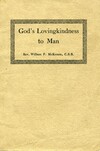Are you sure?
This bookmark will be removed from all folders and any saved notes will be permanently removed.
CHRISTIAN SCIENCE: GOD'S LOVINGKINDNESS PROVED TO MEN
Originally published in the 1914 pamphlet titled CHRISTIAN SCIENCE: GOD'S LOVINGKINDNESS PROVED TO MEN
ALL down the ages some have been enabled to "taste and see that the Lord is good." Being blessed by the lovingkindness of God they recognized the benign influence and praised the source, giving to us our enduring literature in the Scriptures. Mrs. Eddy says: "God is universal; confined to no spot, defined by no dogma, appropriated by no sect. Not more to one than to all, is God demonstrable as divine Life, Truth, and Love; and His people are they that reflect Him—that reflect Love" (Miscellaneous Writings, p. 150).
The human search through all the years has been for something satisfying and enduring. Because of the deceitfulness of false beliefs, men go on spending their "money for that which is not bread," and their "labor for that which satisfieth not." But the testimony of the Scriptures is that in every age there have been those who have recognized the actual truth; not truth relative to the blooming and fading theories of their time, and so as transient as they, but truth that from everlasting to everlasting is the same. This truth has proofs of a certain character, and the most salient proof is healing, whether of sickness, or of plague, or of national fear tending to defeat and disaster. The acceptance of the truth causes immediate reversal of the error which has been posing as fact or acknowledged as reality. The great work of the prophets was to call the attention of men to the real when they were enamored with the unreal, and the idolatrous in consequence. They sought to instil true reverence and true love into the minds of people ever lapsing into the variable devotions and innumerable fears of heathenism. They proclaimed a God of universal goodness, saying, "The earth is full of the goodness of the Lord;" and, "How excellent is thy lovingkindness, O God! therefore the children of men put their trust under the shadow of thy wings."
That writer knew fundamental truth who said, "Thou wilt show me the path of life: in thy presence is fulness of joy." In earliest times we find it recorded of Enoch that he knew this pathway. His brief biography tells us that he "walked with God." It is declared also that he did not die, but that God took him to Himself. The writer of the epistle to the Hebrews says that Enoch had "this testimony, that he pleased God;" so he was "translated that he should not see death." It is habitual for Christians to expect to have, after death, joy in God's presence; but Enoch proved God's presence to be joy and life while here on earth. Noah also reached fellowship with God and was "a preacher of righteousness," as Peter describes him. Being affiliated with divine wisdom, he "prepared an ark to the saving of his house," because he was "warned of God of things not seen as yet."
Enjoy 1 free Sentinel article or audio program each month, including content from 1898 to today.
JSH Collections
This article is included in:
1914 - PAMPHLET
CHRISTIAN SCIENCE: GOD'S LOVINGKINDNESS PROVED TO MEN
JSH-Online has hundreds of pamphlets, anthologies, and special editions for you to discover.



